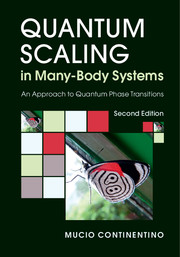Book contents
- Frontmatter
- Dedication
- Contents
- Preface
- 1 Scaling Theory of Quantum Critical Phenomena
- 2 Landau and Gaussian Theories
- 3 Real Space Renormalisation Group Approach
- 4 Renormalisation Group: the ∊-Expansion
- 5 Quantum Phase Transitions
- 6 Heavy Fermions
- 7 A Microscopic Model for Heavy Fermions
- 8 Metal and Superfluid–Insulator Transitions
- 9 Density-Driven Metal–Insulator Transitions
- 10 Mott Transitions
- 11 The Non-Linear Sigma Model
- 12 Superconductor Quantum Critical Points
- 13 Topological Quantum Phase Transitions
- 14 Fluctuation-Induced Quantum Phase Transitions
- 15 Scaling Theory of First-Order Quantum Phase Transitions
- Appendix
- References
- Index
12 - Superconductor Quantum Critical Points
Published online by Cambridge University Press: 04 May 2017
- Frontmatter
- Dedication
- Contents
- Preface
- 1 Scaling Theory of Quantum Critical Phenomena
- 2 Landau and Gaussian Theories
- 3 Real Space Renormalisation Group Approach
- 4 Renormalisation Group: the ∊-Expansion
- 5 Quantum Phase Transitions
- 6 Heavy Fermions
- 7 A Microscopic Model for Heavy Fermions
- 8 Metal and Superfluid–Insulator Transitions
- 9 Density-Driven Metal–Insulator Transitions
- 10 Mott Transitions
- 11 The Non-Linear Sigma Model
- 12 Superconductor Quantum Critical Points
- 13 Topological Quantum Phase Transitions
- 14 Fluctuation-Induced Quantum Phase Transitions
- 15 Scaling Theory of First-Order Quantum Phase Transitions
- Appendix
- References
- Index
Summary
Introduction
In this chapter we examine a special type of quantum critical point related to superconducting zero-temperature instabilities in many-body systems. We consider the case where the superconductor order parameter is inhomogeneous and characterised by a wave vector qC. Inhomogeneous ground states also appear in other systems like magnetic materials, in the form of spin-density waves or helicoidal ground states, in charge density wave systems and in excitonic insulators. They share the existence of a characteristic wave vector that determines the spatial modulation of the order parameter. For superconductors, we consider two cases.
First, the problem, treated independently by Fulde and Ferrell (1964)and Larkin and Ovchinnikov (1965), of an s-wave, singlet superconductor in a homogeneous external magnetic field in the absence of vortices or orbital effects. The predicted ground state is generally known as the FFLO superconductor and is described by an order parameter that oscillates in space like ΔeiqC·r. It arises from the competition between the pairing energy of electrons with opposite spins and the Zeemann energy due to the external magnetic field that forces the alignment of the spins. For sufficiently large magnetic fields the Zeemann energy always wins and the ground state of the system is a spin-polarised, normal fermionic gas. However, as the magnetic field decreases, there is a quantum phase transition to a modulated superconducting state (Samokhin and Marénko, 2006; Caldas and Continentino, 2012) whose nature we identify. We also determine the universality class of this superconducting quantum phase transition. The characteristic wave vector qC of the resulting modulated superconducting phase is related to the difference between the Fermi wave vectors of the antiparallel spin bands that in turn is proportional to the magnetic field. A related question we also investigate is the fate of the uniform superconductor when the magnetic field is increased in the absence of orbital effects. We show that these two extreme approaches, increasing the field in the homogeneous superconductor and decreasing the field starting from the polarised metal do not merge smoothly into one another.
- Type
- Chapter
- Information
- Quantum Scaling in Many-Body SystemsAn Approach to Quantum Phase Transitions, pp. 158 - 176Publisher: Cambridge University PressPrint publication year: 2017



